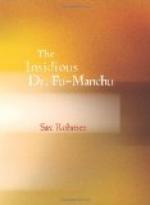“It is officially reported in St. Petersburg that a force of Chinese soldiers and villagers surrounded the house of a Russian subject named Said Effendi, near Khotan, in Chinese Turkestan.
“They fired at the house and set it in flames. There were in the house about 100 Russians, many of whom were killed.
“The Russian Government has instructed its Minister at Peking to make the most vigorous representations on the subject.”—Reuter.
Finally, in a Personal Column, I found the following:—
“Ho-Nan. Have abandoned visit.—Eltham.”
I had just pasted it into my book when Nayland Smith came in and threw himself into an arm-chair, facing me across the table. I showed him the cutting.
“I am glad, for Eltham’s sake—and for the girl’s,” was his comment. “But it marks another victory for Fu-Manchu! Just Heaven! Why is retribution delayed!”
Smith’s darkly tanned face had grown leaner than ever since he had begun his fight with the most uncanny opponent, I suppose, against whom a man ever had pitted himself. He stood up and began restlessly to pace the room, furiously stuffing tobacco into his briar.
“I have seen Sir Lionel Barton,” he said abruptly; “and, to put the whole thing in a nutshell, he has laughed at me! During the months that I have been wondering where he had gone to he has been somewhere in Egypt. He certainly bears a charmed life, for on the evidence of his letter to The Times he has seen things in Tibet which Fu-Manchu would have the West blind to; in fact, I think he has found a new keyhole to the gate of the Indian Empire!”
Long ago we had placed the name of Sir Lionel Barton upon the list of those whose lives stood between Fu-Manchu and the attainment of his end. Orientalist and explorer, the fearless traveler who first had penetrated to Lhassa, who thrice, as a pilgrim, had entered forbidden Mecca, he now had turned his attention again to Tibet—thereby signing his own death-warrant.
“That he has reached England alive is a hopeful sign?” I suggested.
Smith shook his head, and lighted the blackened briar.
“England at present is the web,” he replied. “The spider will be waiting. Petrie, I sometimes despair. Sir Lionel is an impossible man to shepherd. You ought to see his house at Finchley. A low, squat place completely hemmed in by trees. Damp as a swamp; smells like a jungle. Everything topsy-turvy. He only arrived to-day, and he is working and eating (and sleeping I expect), in a study that looks like an earthquake at Sotheby’s auction-rooms. The rest of the house is half a menagerie and half a circus. He has a Bedouin groom, a Chinese body-servant, and Heaven only knows what other strange people!”
“Chinese!”
“Yes, I saw him; a squinting Cantonese he calls Kwee. I don’t like him. Also, there is a secretary known as Strozza, who has an unpleasant face. He is a fine linguist, I understand, and is engaged upon the Spanish notes for Barton’s forthcoming book on the Mayapan temples. By the way, all Sir Lionel’s baggage disappeared from the landing-stage— including his Tibetan notes.”




